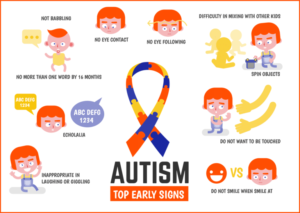Parenting is an incredible journey, but it also comes with its share of uncertainties. If you’ve ever wondered about your child’s development and whether they might be exhibiting signs of autism, it’s important to know that early recognition and intervention can make a significant difference. In this article, we’ll explore the early signs of autism and offer guidance on how to recognize these signs, so you can provide your child with the support they may need.
Is My Child Autistic? Recognizing the Early Signs of Autism
Understanding Autism Spectrum Disorder
Autism Spectrum Disorder (ASD) is a complex developmental condition that affects social interaction, communication, and behavior. It is called a “spectrum” because it encompasses a wide range of symptoms and levels of impairment. Early intervention and diagnosis can lead to more effective support and better outcomes for children with autism.

Early Signs of Autism
Recognizing the early signs of autism can be challenging because every child is unique, and developmental milestones can vary. However, certain red flags and behaviors may indicate the need for further evaluation. These signs typically become more noticeable as a child grows, but some may be observed as early as in the first few months of life:
- Social Communication Difficulties:
Limited eye contact: A child with autism may avoid or have difficulty making eye contact. This behavior may persist even when they are being spoken to directly.
Lack of social engagement: They might not respond to their name being called or show little interest in interacting with others, making it appear as if they are in their own world.
Limited facial expressions: Children with autism may use fewer facial expressions to convey emotions or share experiences. It can be challenging to read their feelings from their expressions.
Difficulty with gestures: They may have trouble using or understanding gestures like pointing or waving, which are essential for communication and social interaction.
- Communication Challenges:
Delayed or absent speech: Some children with autism may not speak or experience significant delays in language development. Others may develop speech but find it challenging to hold conversations.
Difficulty with non-verbal communication: Limited use of gestures, body language, and facial expressions can make it difficult for them to convey their feelings or understand non-verbal cues from others.
Repetitive language: Repetitive use of words or phrases (echolalia) without clear communication intent. This repetition may not always align with the context of the conversation.

- Repetitive Behaviors:
Unusual body movements: Repetitive movements like hand-flapping or rocking, which may serve as self-soothing or sensory-seeking behaviors.
Obsessive interests: An intense focus on specific interests, often to the exclusion of others. These interests can be highly specific and may be perseverative.
Resistance to change: Children with autism may have strong resistance to changes in routine or unexpected transitions. They often prefer predictability and may become distressed when their expectations are not met.
- Sensory Sensitivities:
Heightened sensitivity: Overreaction to sensory stimuli like bright lights, loud sounds, or certain textures. These sensitivities can lead to discomfort or distress.
Hyposensitivity: Insensitivity to pain or temperature, seeking sensory stimulation like deep pressure or intense sensory experiences.
- Limited Social Interaction:
Difficulty forming relationships: Difficulty forming peer relationships or playing with other children, which can lead to social isolation.
Lack of social reciprocity: Difficulty engaging in back-and-forth social interactions, such as taking turns in conversation or responding to others’ cues.

- Delayed Developmental Milestones:
Delays in reaching developmental milestones such as rolling over, crawling, or walking. These delays may be noticeable during the child’s first year of life.
When to Seek Evaluation
If you observe one or more of these signs in your child, it’s essential to seek evaluation and professional guidance. Early intervention is crucial in supporting children with autism in developing essential skills and reaching their full potential.
Recognizing the early signs of autism is a crucial step in providing the best support for your child. Remember that every child develops at their own pace, and some children may exhibit certain behaviors without having autism. However, if you have concerns, it’s always better to seek an evaluation and professional guidance sooner rather than later. Early intervention can make a significant difference in a child’s development and quality of life, helping them thrive and reach their unique potential. Trust your instincts as a parent and be an advocate for your child’s well-being. Your proactive approach can make a world of difference in their journey toward growth and development.







